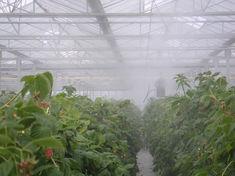
A recently introduced misting machine is being touted as a cheap and viable solution to the problem of how to keep glasshouses cool in summer.
High energy prices have meant that the costs of cooling greenhouses have increased substantially in recent years. But American manufacturer Miatech is now offering UK growers a solution in the shape of a misting machine that can be economically installed in glasshouses.
Miatech produces a range of misting and humidification technologies for the fresh produce sector, with distribution in the UK being undertaken by Phoenix Retail Services.
The Drosia technology now being promoted in the UK is seen as an answer to the overheating of glasshouses, particularly in summer.
The equipment basically consists of a pump with a high pressure water supply, providing a fine mist via up to 100 nozzles placed overhead within the glasshouse. The nozzles contain an extremely small orifice that is able to atomise the water as it is dispersed, allowing the fine spray to be created. The particles evaporate as they fall, providing cooling and humidification for the crops.
Phoenix Retail’s senior manager, Nigel Rumsey, told Commercial Grower that the system has the benefits of cooling the glasshouse by up to five degrees without wetting the crops to any significant extent. When running, the system creates a foggy mist which gives the added benefit of breaking up the sun enough to stop it damaging the plants, he added.
Rumsey continued: “It’s a pretty robust system that requires little maintenance and only one oil change each year. The energy consumption is very small and the water consumption is tiny. It’s also cheap to install.”
Typically on an extremely hot day the system would run on and off throughout the day, for perhaps half an hour out of every hour.
The first installation of the machinery was made some two years ago in the glasshouse of Charles Atkins of Amery Court Farm, Kent.
Atkins, who has used Drosia exclusively on raspberry crops so far, said that he has been switching the system on during the summer months from around May onwards, with average temperature reductions being in the two to three degree range.
Water consumption is low and on a hot day it was possible to save the money back simply through the reduced need to water plants, he added.
Having studied the effects at Amery Court, Phoenix hopes that other growers will also be interested in installing the system.